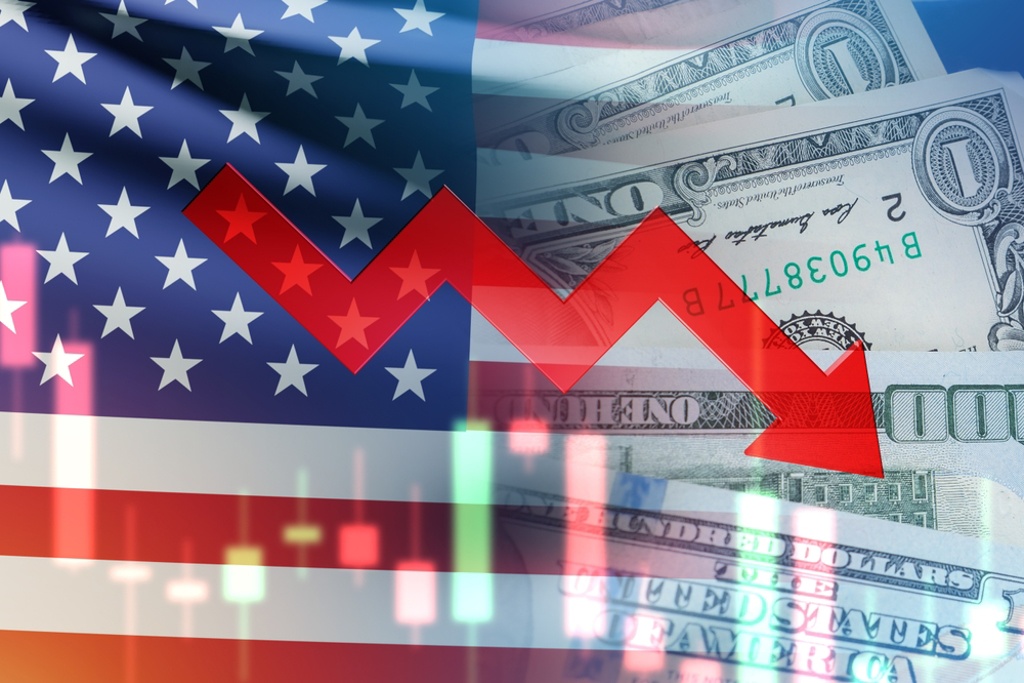Negative hit U.S. stocks suffered a sell-off, "super earnings week" can turn the tide?
The US stock market experienced a quite dark week last week, especially on Friday, when the US stock market was heavily sold off due to multiple bearish factors.
The US stock market experienced a quite dark week last week, especially on Friday, when the US stock market was heavily sold off due to multiple bearish factors.
Specifically, the S&P 500 index fell 0.5% on Friday, closing lower for the sixth consecutive day and falling 3.05% for the entire week, marking the largest weekly decline since March 2023. It also broke through the 5,000 point mark during the week. The Nasdaq Composite Index, mainly composed of technology stocks, fell by about 1.4% and 5.5% for the entire week, marking the worst week since November 2022. The Dow Jones index performed better, closing up 0.56% on Friday and remaining largely unchanged from the previous week.
On Friday, the Chicago Board Options Exchange Volatility Index (VIX) briefly surged to its highest level since late October last year. At the same time, various indicators are showing severe oversold in the market.

Unclear outlook, semiconductor industry plunges
The market decline on Friday was mainly dragged down by the semiconductor industry.
Among them, Super Micro plummeted 23.1% on Friday, closing at $713.65, a new low in over two months. On that day, Super Micro also fell below the 50 day moving average (key support level), and trading volume was also above the average level.
Thanks to the investment of large-scale cloud service providers in artificial intelligence application servers, the stock of Ultra Micro Computer was just included in the S&P 500 index last month. On January 19th of this year, after releasing excellent preliminary results for the second quarter, the stock price of Super Micro soared by 35.9%. This also triggered a round of upward trend, reaching a peak of $1,229 on March 8th.
Last Friday, Super Micro announced that it would release its third quarter results after the closing on April 30th. However, unlike previous quarters, the company did not provide preliminary data on its performance. This has raised concerns in the market about its latest Q1 financial report, as it suggests that the company's financial report may not be as outstanding.
Although analysts currently predict that Super Micro will still record growth in the third quarter ending March 31. Analysts predict that the company's earnings per share will be $5.84, a year-on-year increase of 258%, and sales will be $4.01 billion, a year-on-year increase of 212%. However, the sharp decline of ultramicro computers is not only due to market concerns about their performance prospects, but more importantly, concerns about the overall demand for artificial intelligence in the market.
Two days before the sharp decline of ultramicro computers, due to cautious comments on the industry outlook from global leading semiconductor manufacturing equipment providers ASML and TSMC, market pessimism began to spread, and chip and artificial intelligence stocks were also sold off one after another.
According to ASML's report, the first quarter revenue was 5.29 billion euros, lower than market expectations of 5.39 billion euros, a year-on-year decrease of 21.6%. The most important thing is that the total machine orders for ASML in the first quarter were 3.6 billion euros, a decrease of 4% from the same period last year, far below the market expectation of 5.1 billion euros, and a significant decrease of about two-thirds compared to the previous quarter. This reflects the volatility of market demand and the cautious attitude of customers towards the future economic environment.
ASML's CEO Peter Wennink said, "Our outlook for the full year of 2024 remains unchanged, and we expect the second half of the year to be stronger than the first half, which is consistent with the industry's sustained recovery from the downturn."
TSMC's performance is better. In the first quarter of 2024, TSMC's net revenue reached NT $592.64 billion, higher than the expected NT $582.94 billion, and its net profit reached NT $225.49 billion, also exceeding the expected NT $213.59 billion.
But later, the company lowered its growth forecast for the global semiconductor industry (excluding memory) from over 10% to around 10%, and lowered its growth forecast for the global wafer foundry industry from the previous 20% to 10%. TSMC's downward revision of market growth prospects further dampened market sentiment.
Last week, ASML fell by a total of 10.6%, while TSMC's stock price fell by 10.4%. The decline of both has also affected other chip and artificial intelligence related stocks, especially "star stocks".
The first to bear the brunt is NVIDIA. Last Friday, Nvidia plummeted by 10%, evaporating its market value by $212 billion, breaking the company's historical record. Throughout the week, Nvidia plummeted by 13.6%, about 22% below its peak in March.
As the market fell, other star chip stocks such as Arm also fell by about 17% on Friday and plummeted by 31% throughout the week.

"Super Earnings Week" will start
This week, the U.S. stock "Mag-7" will have four companies will be released earnings, the market will also usher in a "super earnings week."
Tesla, Meta, Microsoft, and Google's parent company Alphabet will each disclose their financial reports this week. The latest performance reports and expected revenue of these companies will have a huge impact on their industry and even the entire market. Among them, Microsoft, Google, and Meta will provide insights into the prospects of industries such as artificial intelligence, cloud computing, and online advertising. Tesla's financial report and guidelines will provide more relevant information on the electric vehicle industry.
However, the super earnings week could provide a positive catalyst for the stock market, as well as trigger a new round of stock selling, as investors saw last week.
Among the four upcoming financial reports, Tesla appears to be the most "dangerous". This Tuesday, Tesla will be the first to release its financial report. Wall Street predicts that Tesla's first quarter profits will decrease by about 42%, while sales will decrease by 4.5%.
Before the financial report was released, Tesla conducted a global round of car price adjustments last weekend.
Last Saturday, Tesla lowered the prices of Model Y, S, and X in the United States by $2,000, while also lowering the price of Fully Autonomous Driving (FSD) from $12,000 to $8,000. Last Sunday, Tesla lowered the price of Model 3/Y in China by nearly $2,000 and lowered the prices of Model S and X by 22%. In addition, Tesla has lowered the price of the Model 3 in major European markets by approximately $2,100 to $3,200.
The new round of price adjustments means that Tesla is still seeking to increase market share through price reductions, reflecting the dilemma of slowing demand and intensifying competition in the electric vehicle industry. Since the beginning of this year, Tesla has fallen by about 33%, ranking last among the seven giants in the US stock market.
For Tesla, its current growth strategy is still relatively vague. In this financial report, the market will focus on Tesla's robot taxi plan and whether the company will shelve plans for the next generation low-cost car (known as the Model 2).
Microsoft's performance was also relatively weak last week. The stock fell 1.2% last Friday and 5% for the entire week. Analysts predict that Microsoft's earnings per share in the third quarter will be $2.82, a year-on-year increase of 15%, and sales will be $60.8 billion, a year-on-year increase of 15%.
Analysts will closely monitor Microsoft's cloud computing business, including Azure and Office. Investors also want to know about Microsoft's progress in commercializing investments in generative artificial intelligence, such as Copilot products.
Meta will release its report on Wednesday evening. Analysts predict that the company's sales will increase by 26% and profits will increase by 95%. Due to Meta's significant investment in both artificial intelligence and metaverse businesses, analysts will focus on Meta's capital expenditures and other costs.
Alphabet will announce its first quarter earnings after the stock market closes on Thursday. Analysts expect earnings per share to be $1.51, a 29% increase from the same period last year. Revenue is expected to increase by 13% to reach $78.7 billion.
·Original
Disclaimer: The views in this article are from the original Creator and do not represent the views or position of Hawk Insight. The content of the article is for reference, communication and learning only, and does not constitute investment advice. If it involves copyright issues, please contact us for deletion.